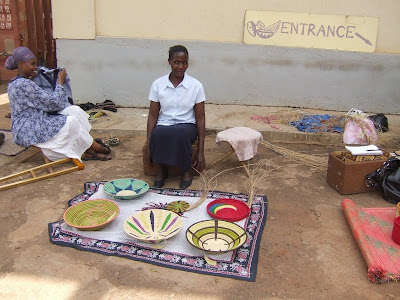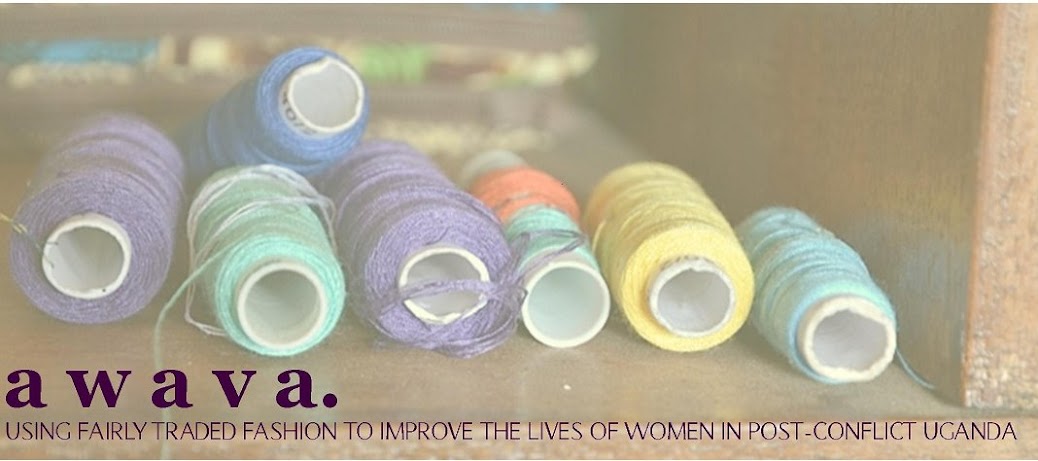Wednesday, June 30th, we woke up early, Andrew and Autumn, Awava’s US visitors in tow, and headed for the EMS shipping office on Kampala Road to ship a very important special order to The Community Mercantile before heading to Bat Valley to meet the Uganda Craft artisans making items for Awava.
Uganda Craft is the only Fair Trade Certified craft store in Uganda, and our partnership with them is quite different than that of our other groups. With this partnership, we go through Uganda Craft for products instead of going directly through the artisans meaning that Uganda Craft also receives a small percentage of the cost for coordinating orders and handling quality control. The artisans with Uganda Craft set the price they want to receive and then Uganda Craft adds their fee into the equation meaning Awava is not simply supporting these artisans but also supporting the single craft store in the country devoted to promoting fair and alternative trade. They are a great organization and Awava is proud to pay a little bit more than they have to in order to play a part in helping Uganda Craft thrive.
Typically we are able to see the artisans making goodies for Awava on Friday mornings when they come to sell their products to the store, but we were hoping for an extra bit of quality time with the artisans and decided to schedule a meeting for Wednesday.
Autumn, Andrew and I pulled up to the store and the ladies were all sitting outside eagerly awaiting our arrival. We were greeted with smiles, hugs and handshakes and an eagerness to sit and talk. We formed a circle with some stools and mats outside as I greeted the women and suggested we all go in a circle and tell each other a bit about ourselves. Two of the women do not speak English (and my Luganda is severely limited) so Rose, one of the artisans who is also a shop attendant for Uganda Craft, was kind enough to translate.
As we were all chatting, it became apparent to me that most of the five wonderful women were needing various things which they rarely had enough money at one time to cater for. One woman desperately needs and eye exam and glasses, a few others need to finish paying their balances on their children’s school fees, one even needs corrective surgery for what appears to be a very bad cataract in her left eye. Awava has been planning to provide interest-free credit loans to artisans, and piloting the program with Uganda Craft artisans since the store would be able to provide some very necessary logistical support, and to me this seemed to be a great opportunity for kick off.
We finished our introductions (now, I know this sounds stuffy but I assure you it was not) and I asked that the artisans go into the store and pick each of the products that they make, not simply the one’s for Awava.

Yudaya Nakibuka, the artisan who makes Awava's Ekibbo Baskets.
While Autumn and Andrew helped pick and carry items and arrange them on mats, I spoke with Nina, the manager of the store, to see if she thought it was a good idea to announce this program and if she could come help to translate. Nina’s eyes lit up and she said “absolutely”!
With the ladies’ beautiful products displayed on mats on the ground, we regrouped and each woman showed us and told us about the process of making their products. We took lots of photos, ooed and awed over their creations and then returned them to their proper places within the shop. And then met once more, with Nina, do announce the roll out of our credit scheme! The women were ecstatic as we explained the program and how they would pay their loans back. We made sure to reiterate that loans would be available only when Awava had the extra money to give. Their excitement and my excitement were almost too much!
After explaining how the loans would work and answering lots of questions, we decided that it was time for lunch and that when we returned to the store Nina and I would sit down individually with the artisans and see how much they were needing, what it was for and how they would pay back the loan.
The 9 of us got up and moved about 300 meters to a new restaurant near Uganda Craft for lunch (compliments of Awava of course). This place had some of the best local food I have ever had, buffet style, and the ladies made fun of how little us bazungu (white people) eat aside from Andrew who managed to go back to the buffet for a second heaping plate of deliciousness, taking a break from his extensive conversation about World Cut football with Rose.
I took lots of notes and committed to returning Friday afternoon (after the ladies were done selling their things to the store) with money and contracts in hand.

Nabalema Edith, creator of Awava's Musoke Basket and loan recipient.
Thursday ended up being a day filled with down time due to multiple defiant colons. We had big plans of going to Kiembe and Owino to pick up loads and loads of tailoring materials to send to Gulu (Awava has a seriously massive bag order coming from a very exciting partnership…..details on this later) but alas, this was not going to happen. Andrew and Autumn needed to get well before heading for Tanzania to visit another project early Friday morning. So Thursday I spent getting things ready for our exciting kick off to the Awava credit program!
At midday on Friday I arrived at Uganda Craft and was greeted again by two of the artisans seeking assistance. Nina and I met with each separately and went through the contract, signing and handing over loans.
Nabalema Edith who makes Awava’s Kasayi baskets needed money to top up her children’s school fees for the term, and Nayiga Bena, the woman making the Musoke baskets, needed the same. Awava needed to order many more of these baskets so we placed an order of 30 of each, and upon delivery, Nayiga Bena will have paid 60% of her loan off and Nabalema Edith, 50%. What we’ve done is let the artisan set the amount of money that is withheld from each piece in order to pay back their loans. This way they are still receiving some money, but some is withheld by Awava for loan payback. The most exciting part of these two meetings to me was that both women asked if they could also bring cash to put toward the loan when they had extra. They want to pay the loans off quickly but keeping their children in school, uninterrupted is the most important thing to them. This program allows for this. The majority of the population here in Uganda lives “paycheck to paycheck”. Saving money is very difficult, not because people are spending frivolously, but because they make very little yet have so many expenses. Awava’s new interest-free credit is an easy way for the artisans to keep up with the more expensive things, like school fees or medical treatments, and even investing in growing their businesses.

Nayiga Bena is the creator of Awava's Musoke Basket and loan recipient.
Later this week Awava will be meeting with a couple of other artisans to sign contracts, deliver on their loans and come up with re-payment plans.
The fact that Awava is finally at a point where we can offer these services is astonishing to me. It makes me feel like we’re doing an awful lot right even if we often feel lost from time to time. The differences we see made in the lives of the artisans makes such a huge difference in our lives, and hopefully the lives of the consumers.

No comments:
Post a Comment